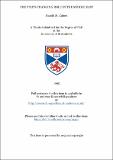Files in this item
The PFLP's changing role in the Middle East
Item metadata
| dc.contributor.author | Cubert, Harold M. | |
| dc.coverage.spatial | 391 p. | en_US |
| dc.date.accessioned | 2018-05-22T08:43:51Z | |
| dc.date.available | 2018-05-22T08:43:51Z | |
| dc.date.issued | 1995-07 | |
| dc.identifier.uri | https://hdl.handle.net/10023/13437 | |
| dc.description.abstract | The PFLP represents a violent Marxist trend among Palestinian political organizations. It is uncompromisingly hostile toward Israel, the industrialized West and the West's regional allies, and rejects any settlement of the Arab-Israeli conflict which does not entail both Israel's elimination and the establishment of an independent Palestinian state on all land it claims as Palestine. Until this occurs, the PFLP remains committed to armed conflict with its enemies. This study attempts to explain the PFLP's lagging position within the Palestinian national movement by comparing its policies with Fatah's. Unlike the PFLP, Fatah's overriding concern was to establish a Palestinian authority on any portion of 'liberated land' and consider the question of Israel's existence later. Fatah's selection of supporters was never conditioned upon ideological compatibility. It formed coalitions with all interested parties and accepted assistance from all willing providers. Most importantly, Fatah - as the PLO's dominant faction - transformed itself from an underground group to a quasi-government with diplomatic status and later, to leadership of the PNA in the West Bank and Gaza Strip. Fatah's flexibility enabled it to survive regional and global changes. In the unipolar international order which followed the Soviet bloc's collapse in 1991, the PLO courted the United States and its allies, participated in the Arab-Israeli peace process, and was rewarded with authority over part of the Palestinian 'homeland'. The PFLP, spurning change, refused to act likewise. From its Damascus headquarters, it can currently do nothing without the Syrian government's approval and Syria, on the verge of a peace agreement with Israel, is unlikely to allow its protege to do more than issue statements. Only an imaginative and bold move by the PFLP, at this point, can restore the organization's prestige among its constituents and notoriety among its enemies. | en_US |
| dc.language.iso | en | en_US |
| dc.publisher | University of St Andrews | |
| dc.subject.lcc | DS119.7C9 | en |
| dc.subject.lcsh | Arab-Israeli conflict. Jewish-Arab relations. | en |
| dc.title | The PFLP's changing role in the Middle East | en_US |
| dc.type | Thesis | en_US |
| dc.type.qualificationlevel | Doctoral | en_US |
| dc.type.qualificationname | PhD Doctor of Philosophy | en_US |
| dc.publisher.institution | The University of St Andrews | en_US |
This item appears in the following Collection(s)
Items in the St Andrews Research Repository are protected by copyright, with all rights reserved, unless otherwise indicated.

